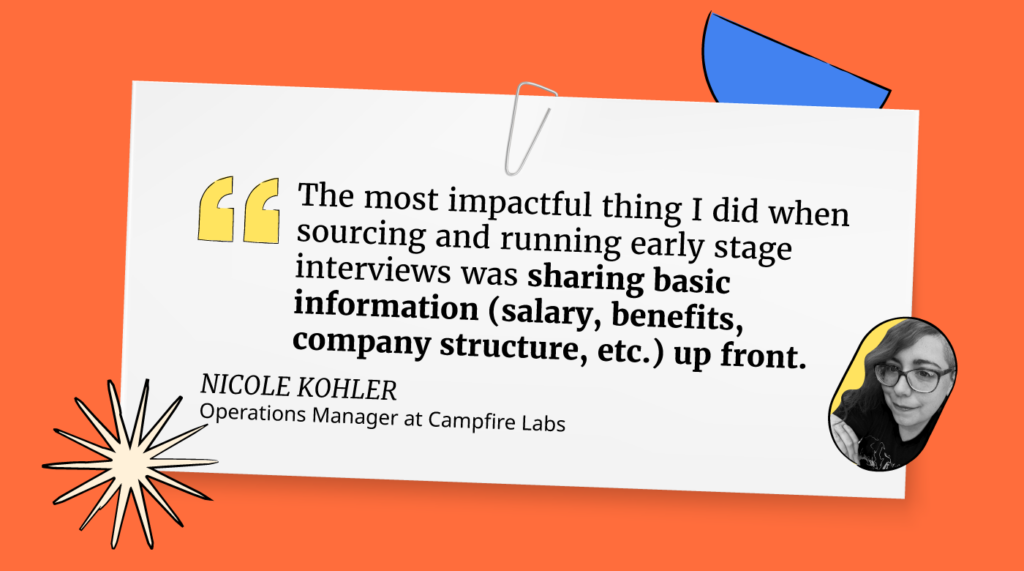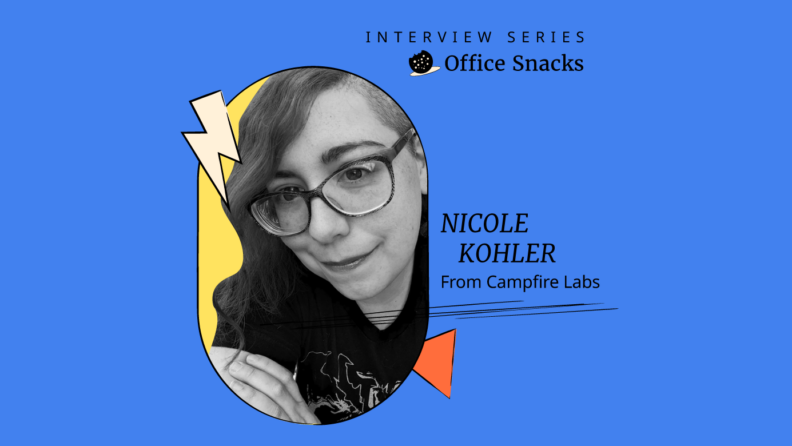In our Office Snacks series we interview members of our community to delve into their varied buffets of experience and come away with juicy insights and ideas.
Join us in our next installment below as Nicole Kohler, Operations Manager at Campfire Labs—shares her wisdom with us.
Hi Nicole! We’d love to get to know you better, where are you based?
I’m in Manchester, Pennsylvania, USA. Manchester is a tiny little borough of about 2,500 people; it’s home to lots of folks who own farms and work in manufacturing. We’re big enough to have more than one stoplight, but not so big that we have Uber service (though we recently started getting UberEats deliveries!).
How’d you get to where you are today?
Whew. Long story cut very short: I worked in marketing and content for a wallpaper manufacturer, some local agencies, and a really large tech company before I landed a role in content and strategy at Animalz. Over time, I realized that my passion was less about writing and more about helping other people grow. That first looked like me running a team and teaching strategy, but eventually it turned into a role in people ops.
After a busy two years or so working on hiring at Animalz, I decided it was time for a change and started looking for new opportunities. A mutual friend connected me and Hal (the GM at Campfire Labs), and I eagerly joined to work on growing the agency’s operations and team from the ground up.
How does your typical day look, do you have a set routine you stick to?
I usually wake up between 8:30 and 9:30 am, drink a very tall cold brew, and catch up on email, Slack, and LinkedIn. I eat lunch between noon and 2 (assuming I don’t forget… I forget a lot). Usually sometime around 4 pm I will step away for a nap, then have dinner. And then sometime before the end of the evening I’ll hop back online for another hour or so.
That final hour in the evening tends to be when I think the clearest and work the fastest, so I save it for any heads down strategic work, research, or tasks I’ve found difficult to complete while everyone else is online.
How do you describe your job to others?
When I changed roles, I told my family “I work in HR now.” They get it a lot better than they did when I tried to explain what content marketing was!
To strangers who are more likely to “get it,” I say “I’m in charge of operations at a small marketing agency.”
What’s your favorite part of your job?
Finding ways to sneak my previous experience or not-ops-related skills into being useful. Because I come from a content marketing background, and have worked at agencies and in-house before, the team can call on me to ask about things that aren’t necessarily related to my current work.
For example, right now I’m working on our company content strategy; last month I helped us put together new terms of service for our clients.
What’s your biggest challenge?
Keeping track of everything. That’s kind of a broad answer, but to give you a more specific example: if someone’s title changes, I have to update multiple systems, contact an external partner (sometimes two), make sure the team is notified, and so on. There’s lots of little details and it’s easy to miss something, even with only 12 people.

In your opinion, what’re the most effective ways to build an employer brand?
Take care of your employees. I’ve seen a lot of employer branding campaigns that feel stilted and fake, and it’s because the employees are reading a script in a video or have written something that’s been edited.
You know what doesn’t feel fake? Someone spontaneously writing a LinkedIn post about how they took a 10 day vacation because they have a great work life balance. If you walk the walk, your employees will talk the talk for you.
Which are your most-loved tools to help you with your job?
- ClickUp - I use it for our internal wiki, notes, to-do lists, and future planning.
- Google Calendar - not just for meetings, but also time blocking for upcoming tasks.
- Leapsome - performance management for our team.
- Divvy - budgeting and virtual cards.
- Homerun - our beloved ATS!
What’s been your most successful initiative to date and why?
Rolling out benefits (health care, retirement accounts, and yearly stipends) to our U.S. and Canadian employees almost simultaneously. It took SO MUCH work and was a huge challenge because I’d never done anything like it before. But it made a huge difference for our team to have access to all of this. It’s also helped a lot with hiring new folks.
What’s your number one piece of advice for attracting top talent?
The most impactful things I did when when sourcing and running early stage interviews was sharing basic information (salary, benefits company structure) up front.
Ideally you want someone to know that when they view the job post, but if you aren’t putting it there, they should know it within 15 minutes of talking to a recruiter.
Yes, it hurts for a candidate to see your salary range and say no right away. But I had so many people respond positively to those numbers being disclosed, because so many companies just don’t do it. And many of the folks who were out of my target range referred people to me later who I did end up hiring.
What would you like to see companies do more when it comes to their employees?
Create career development plans, use them fairly, and talk about them regularly. All three parts of this equation are important.
I’ve seen companies that have these plans, but sneak around the salary bands when they find a star hire; I’ve seen others that have them, but kind of let them fester and die despite employee feedback coming in on how they could be improved.
There’s so much more to career development than just putting out guidelines: you have to use them and maintain them.
Lastly, and most importantly, what’s your favourite office snack?
Potato chips. I’m definitely a salty snack person!
A fun aside: my maiden name was Utz, which is a popular brand of snacks on the US East Coast. I often joke that I married my husband just so I’d stop getting asked if I was a potato chip heiress. (Sadly, I’m not. I think.)
What’s your favorite office snack?
Work in People and Culture? Want to share your ideas?
Applications to be interviewed are open to anyone (yes anyone!) so don’t hesitate to fill in the form for an opportunity to share your knowledge and ideas.


